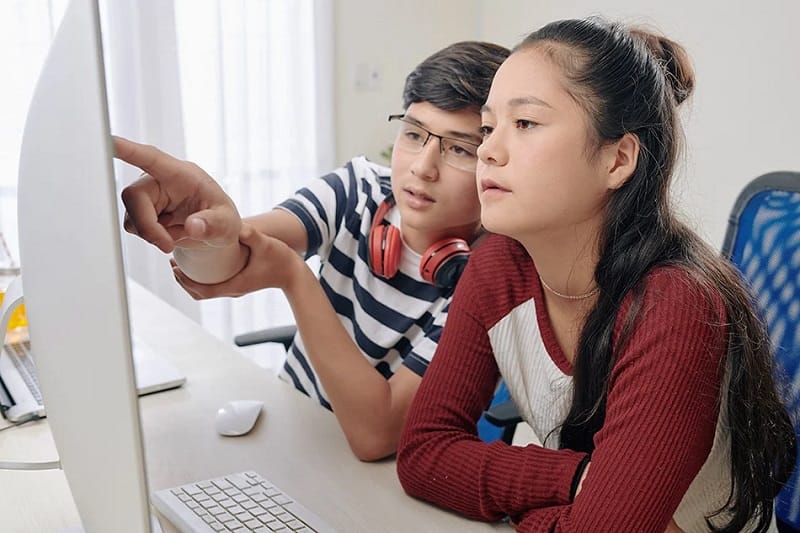
2020-2021 have been a decisive year for the transition from traditional education to virtual education, and today, studies can no longer be understood without the use of new technologies.
With the consequent closure of educational centers, the confinement forced teachers and students to adapt in record time to online education and develop a series of digital skills necessary to take full advantage of this new way of teaching and learning.
ADVERTISEMENT
Teachers, students, and families have made a great effort to adapt to the new digital skills required by distance education. What digital skills should teachers, students, and parents have?
What are digital competencies?
Let’s start at the beginning. According to the European Commission, digital competencies could be defined as “a set of skills and knowledge that enable the critical and safe use of information and communication technologies (ICT) for work, leisure, and communication”.
They are also key competencies necessary for social and professional integration.
For the European Parliament, “digital competence is based on the ability to use computers to retrieve, evaluate, store, produce, present and exchange information and to communicate and participate in collaborative networks via the Internet”.
These digital competencies are collected and developed in the Framework for the Development and Understanding of Digital Competence in Europe (DIGCOMP).
Specifically, in the field of learning, in the Information Society, it is essential to have new technical and cognitive skills to meet the challenges of knowledge that arise when interactive tools are changing the way of educating and studying.
ADVERTISEMENT

The role of teachers in the digital environment
In this new scenario, the training of teachers in digital skills is essential both to improve the way they teach and to connect with students.
Teachers have had to accelerate incorporating digital competencies to implement them in their new virtual classrooms. This different educational space requires combining the usual basic skills with the wide range of programs and digital tools designed for the academic environment.
It determines and evaluates the knowledge and skills that teachers must acquire to be digitally competent and thus manage and introduce ICT in the classroom.
The Common Framework for Digital Competence in Teaching divides digital competencies into five major areas that, in turn, encompass 21 competencies with six different levels:
Information and information literacy. It enables teachers to locate, organize and store information and digital content and identify their possibilities for incorporating them into learning.
Communication and collaboration. In this phase, the teaching staff can share online resources and interact in virtual communities.
ADVERTISEMENT
Creation of digital content. It involves creating and editing content -such as videos, images, and texts- in different formats and spaces, such as blogs or websites.
Security. This area emphasizes the need to protect the information, especially personal information, adopt security measures and make responsible use of technology.
Problem-solving. This is the last link of digital teaching skills and encompasses issues such as solving conceptual problems using digital media, updating knowledge, or solving technical problems.
Therefore, today’s teachers must have the ability to collect valuable information from the network, make and share video tutorials to share it, as well as create and edit digital audio to stimulate students and capture their attention in the classroom.
ADVERTISEMENT
In addition, they must have the skills to share study materials through online platforms, create videos and infographics, and take advantage of video games and gamification for pedagogical purposes.
Moreover, they must check for plagiarism and understand copyright issues in a world where students’ work is increasingly susceptible to being copied from the Web.

Digital skills at students
Interactive tools are changing the way we teach and the way we learn, so digital skills have become an essential element in today’s school curricula.
For students to acquire these digital skills, teachers must be trained and accredited in turn.
People born after 2000 are often considered digital natives, having been born into a world dominated by technology.
ADVERTISEMENT
From a very early age, they live in homes with more screens than print media. They prefer image to text and are fluent with screens and technological devices, especially smartphones.
21st-century learners have fluid interactions and contacts with technologies. They master them skillfully, but only for certain purposes and in specific contexts. “I can ask my friend to help me write my papers even though he lives on the other side of the world. We just call on the Zoom, share the document, and get to work,” says the 19-year-old Peter.
They may be evident on posting a video on TikTok or a story on Instagram. Still, they are not as confident when writing a formal e-mail or creating a document and sharing it using collaborative tools.
Therefore, formal education must reinforce the acquisition of digital competences among the child and youth population, as they have become a key element to learn how to use the necessary tools in a virtual educational context.
ADVERTISEMENT

Digital competencies
Digital learners can solve problems, make the right decisions, and take advantage of the Web’s resources to produce their content, publish it, and share it.
They can use technology creatively and generate videos and animated presentations. They can communicate and interact with the rest of the students or other people and learn to work collaboratively.
They must also be able to collect, select, analyze and use the information on the Internet intelligently and evaluate it according to the sources from which it is obtained.
It is equally important that they know how to behave respectfully and responsibly when using information and communication technologies and learn to be good digital citizens who contribute to the development of their community.
ADVERTISEMENT
These digital skills will also be decisive in the future. With the passage of time and the development of new technologies, more and more skills will have to be acquired to adapt to the environment in their profession and in their lives.

E-learning, a challenge for families
Students and teachers are not the only ones who have had to adapt to the online education imposed by the coronavirus pandemic.
Parents too, because they have often been forced to hand over their digital devices to their children and have invested their patience, time and energy in accompanying their offspring – especially the youngest ones – as they plunge into virtual education.
Teachers are responsible for preparing the academic content and adapting it to virtual education. However, parents must be prepared to accompany their children in the educational process, also online.
ADVERTISEMENT
Online education poses an unequal challenge for each family: not all of them have a computer at home for the exclusive use of their son or daughter, nor do they have the same quality of Internet connection, nor do they all have the same digital skills, especially if it is the first time they face online study.
Therefore, e-learning is also a challenge for families.
Parents must acquire the basic digital skills to supervise and accompany their children in their online classes and become familiar with the educational platforms they use in their school.
Accompanying them daily in the distance learning strategy is a vital support for them and the teaching staff.
The future of education will be digital.
ADVERTISEMENT
The process of virtual education that has been experienced in recent years has accelerated the evolution of an education that will continue to focus on the digital environment in the coming years.

Teachers, families and students must be aware of the importance of digital skills in a learning process that will require their involvement so that future generations can face the future with guarantees.
ADVERTISEMENT











